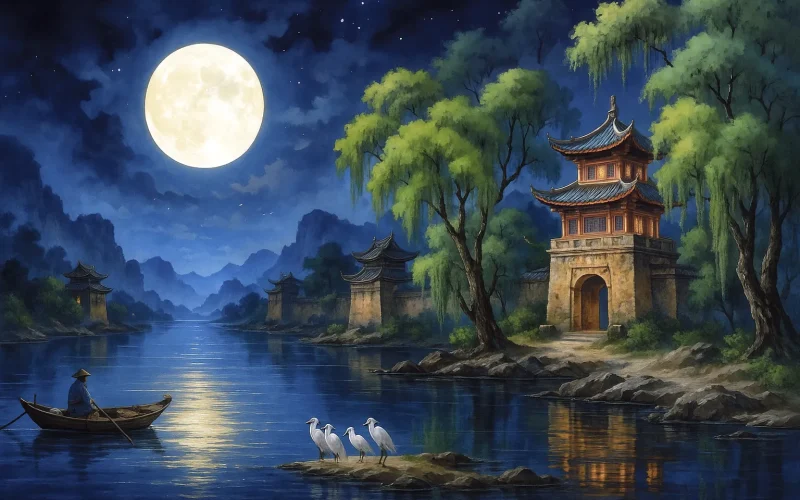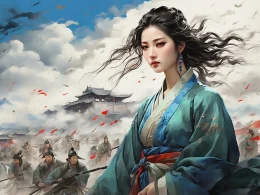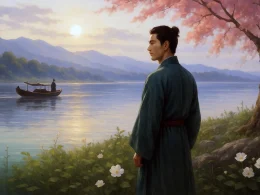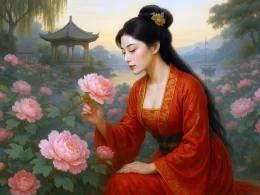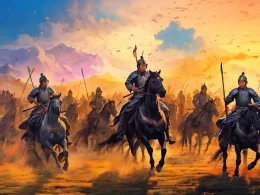By Xiang River's isle I linger as the moon descends;
Slanting, sparse blooms cast tiny shadows,
Their sorrow seeping into ripples.
Who knows of this spring's hidden heart?
The east wind chills—
Fragrance drifts far, a crimson-skirted ghost returning.
Gone are gulls of bygone wanderings.
Afar, I mourn the barely-there blossoms,
Their dreams clinging like mist.
Nine-peaked clouds vanish—a soul's broken cry.
Love's bloodstains
Now seep through emerald bamboo shoots.
Original Poem
「小重山令 · 赋潭州红梅」
人绕湘皋月坠时。
斜横花树小,浸愁漪。
一春幽事有谁知?
东风冷,香远茜裙归。鸥去昔游非。
姜夔
遥怜花可可,梦依依。
九疑云杳断魂啼。
相思血,都沁绿筠枝。
Interpretation
Composed in 1086 during the Southern Song Dynasty, this ci poem was written when Jiang Kui resided in Tanzhou (modern Changsha, Hunan). Nestled along the Xiang River with its humid climate, Changsha was renowned as a haven for red plum blossoms. While ostensibly celebrating the local plum blossoms, the work is in fact a lyrical vessel for the poet's nostalgia for a lost love and profound sorrow of separation. As scholar Xia Chengtao's research reveals, Jiang's parting with his "Hefei lover" invariably coincided with plum blossom season, making his numerous plum poems—including this one—disguised elegies for that relationship.
First Stanza: "人绕湘皋月坠时。斜横花树小,浸愁漪。一春幽事有谁知?东风冷,香远茜裙归。"
Rén rào Xiāng gāo yuè zhuì shí. Xié héng huā shù xiǎo, jìn chóu yī. Yī chūn yōu shì yǒu shéi zhī? Dōngfēng lěng, xiāng yuǎn qiàn qún guī.
Pacing Xiang's moonlit shore at moondown hour,
Slanting plum boughs—petite,
Cast trembling shadows of sorrow.
Who knows a spring's secret affairs?
The east wind chills,
Her crimson skirt fades with the fragrance hollow.
The opening paints a solitary moonlit scene where plum shadows blend with watery "ripples of sorrow," merging emotion and landscape. The visionary "crimson skirt fades" (香远茜裙归) transforms blossoms into a departing lover, embodying the poem's central motif: absence lingering in fragrance. The "east wind's chill" (东风冷) carries both seasonal and emotional resonance.
Second Stanza: "鸥去昔游非。遥怜花可可,梦依依。九疑云杳断魂啼。相思血,都沁绿筠枝。"
Ōu qù xī yóu fēi. Yáo lián huā kě kě, mèng yī yī. Jiǔ yí yún yǎo duàn hún tí. Xiāngsī xuè, dōu qìn lǜ yún zhī.
Gulls vanish—past joys erased.
Afar, I cherish blossoms' fleeting grace,
That haunt my dreams unresolved.
Nine Doubts Mountain's clouds swallow
The soul-tearing wail—
All love's blood now seeps
Into bamboo's emerald veins involved.
The stanza deepens the lament. "Gulls vanish" (鸥去) symbolizes irretrievable memories, while "Nine Doubts Mountain" (九疑) invokes the myth of Emperor Shun's grieving consorts whose tears stained bamboo with spots—here reimagined as "love's blood" (相思血) staining plum blossoms. This metamorphosis of botanical pigmentation into emotional trauma elevates personal grief to mythical dimensions.
Holistic Appreciation
Though ostensibly a poem about plum blossoms, this lyric is in fact a profound emotional allegory. The first stanza paints a moonlit scene of the Xiang River with slanting shadows of red plum blossoms, depicting a solitary figure wandering the riverside steeped in melancholy. The second stanza weaves dreams and allusions to express deep affection, invoking the legend of the Xiang River goddesses whose "tears stained the mottled bamboo," creating a misty and poignant lyrical atmosphere. The poem masterfully intertwines object and subject, reality and imagination—using the plum's "fragrance," "delicacy," "distance," and "return" to portray the beloved's image, while the goddesses' tears mirror the poet's longing. Layer by layer, it conveys the sorrow of separation with restrained elegance and exquisite subtlety. Rich in imagery and profound in emotion, the poem exemplifies Jiang Kui's superb technique of "expressing emotion through objects and revealing the heart through scenery."
Artistic Merits
- Empathetic Imagery, Blending Real and Ethereal: The lyric employs empathetic projection, infusing subjective emotions into the crimson plum through phrases like "steeping sorrowful ripples" ("浸愁漪"), "fragrance drifting far" ("香远"), and "lingering dream" ("梦依依"), crafting a lyrical world where inner and outer realms merge.
- Seamless Classical Allusions: The reference to Xiang goddesses’ "tear-stained bamboo" naturally mirrors the poet’s grief, enriching the poem’s cultural resonance and deepening the plum’s symbolic weight.
- Melodic Diction, Subtle Nuances: Reduplicated words like "faintly" ("可可") and "lingeringly" ("依依") enhance rhythmic beauty while conveying tender affection. The verses, dreamlike and haunting, balance musicality with vivid imagery.
- Fluid Structure, Effortless Transitions: The stanzas transition organically; the interlude "gulls depart" ("鸥去") expands spatial scope, while the "Nine Doubts Mountain" ("九疑") allusion draws the focus inward—a testament to the poet’s structural finesse.
Insights
This lyric transcends mere nature description, emerging as a vessel for unspoken longing. It reveals that in literary creation, the most moving expressions often lie not in explicit declarations but in channeling emotion through objects and allusions, where layered imagery carries deeper reverberations. Jiang Kui transforms plum blossoms into a beloved's shadow and the goddesses' bamboo into a metaphor for devotion, blending historical depth with poetic ethereality. His artistry reminds us that true yearning seldom speaks directly—it lingers, half-veiled, through countless images, haunting and eternal. The poem shows that profound love often resides not in overt words, but in the subtle interplay of symbols that whisper endlessly between the lines.
About the poet
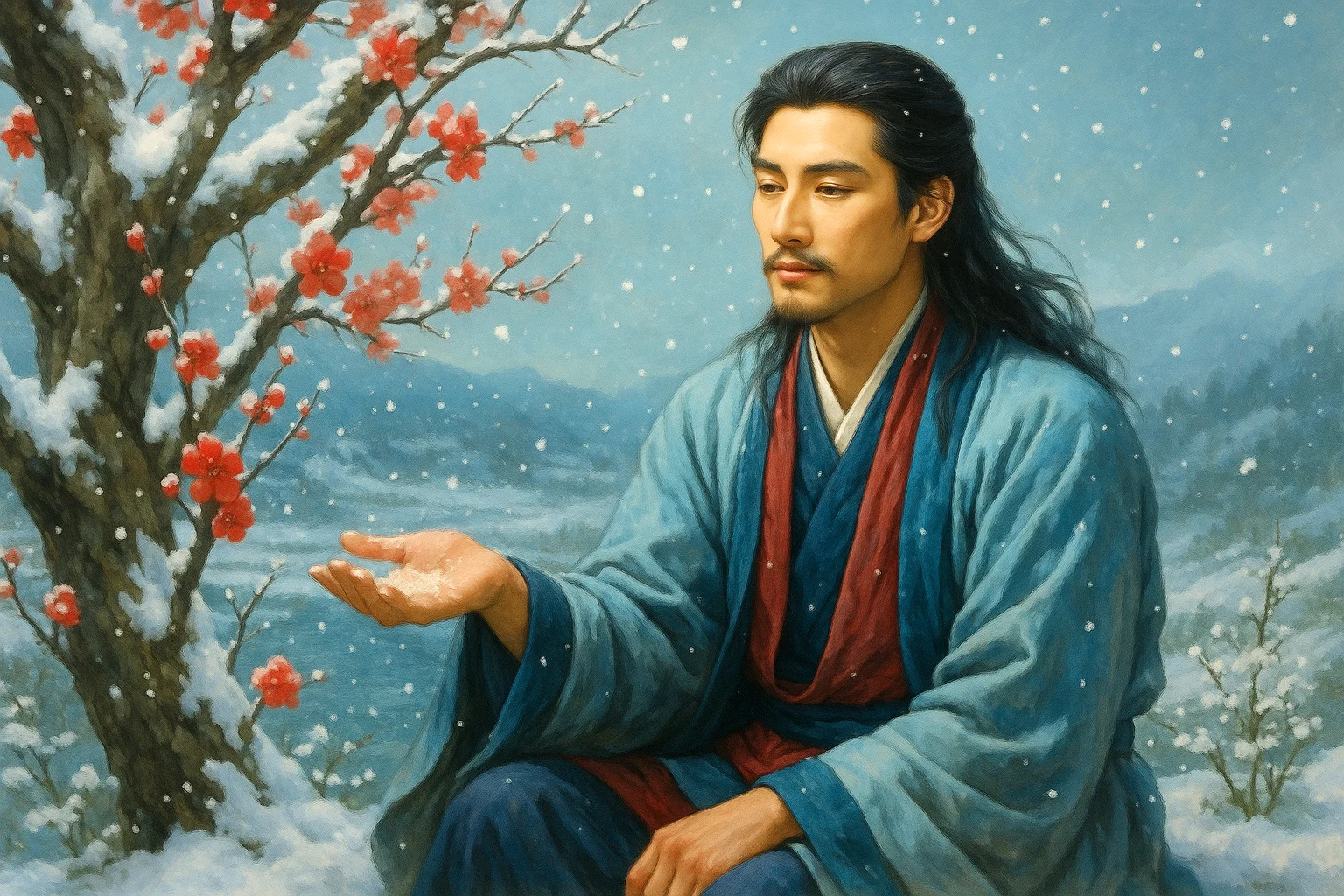
Jiang Kui (姜夔, c. 1155 - 1221), a native of Poyang, Jiangxi, was a Southern Song Dynasty lyric poet and musician. He remained a commoner throughout his life. His lyrics are known for their ethereal and austere style, and his poetry is also highly regarded. Along with Fan Chengda and Yang Wanli, he is celebrated as one of the "Four Great Masters of the Restoration."







